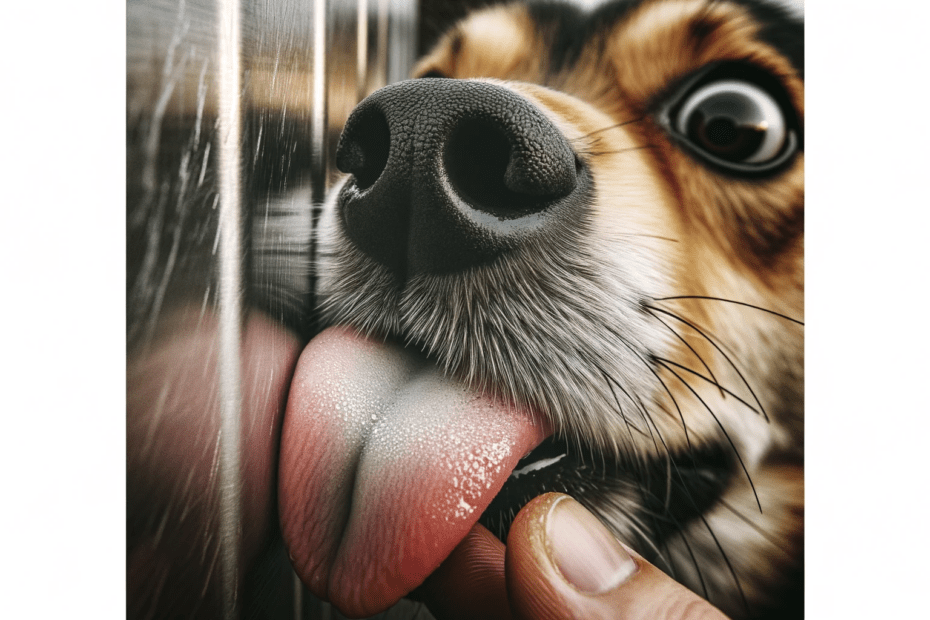In the realm of canine behavior, certain peculiarities can often leave owners questioning their pets’ actions. One such behavior that may puzzle dog owners is the act of licking metal surfaces.
This article aims to shed light on the reasons behind this behavior by exploring both the behavioral and health implications associated with metal licking.
Additionally, the influence of environmental factors and effective training techniques to discourage this behavior will be examined.
Finally, guidance on when to seek veterinary advice will be provided.
Key Takeaways
- Dogs may lick metal objects as a form of sensory exploration or due to nutrient deficiencies.
- Compulsive metal licking can be a sign of underlying medical or psychological conditions.
- Metal licking can have potential health implications, including oral injuries, ingestion of harmful substances, and dental problems.
- Environmental factors, such as access to toxic metals or lack of appropriate alternatives, can influence metal licking behavior.
Behavioral Reasons for Metal Licking
One possible explanation for dogs licking metal is due to their instinctual and exploratory nature, which leads them to investigate and interact with different textures and objects. While it may seem peculiar to humans, dogs explore their environment through sensory exploration, and licking metal surfaces is just one way they satisfy this curiosity.
Several causes can contribute to a dog’s inclination to lick metal. Firstly, it could be a result of a nutrient deficiency in their diet. Dogs might lick metal objects seeking essential minerals like iron or zinc.
Secondly, dogs may engage in metal licking as a form of self-soothing or stress relief. Similar to how humans might chew on their nails or pen caps when anxious, dogs may resort to licking metal objects to calm themselves.
Lastly, some dogs may develop a compulsive behavior of metal licking, which can be a manifestation of an underlying medical or psychological condition.
To prevent dogs from licking metal, it is crucial to address the underlying causes. Providing a balanced and nutritious diet can help eliminate the possibility of nutrient deficiencies. Additionally, ensuring that dogs have ample mental and physical stimulation can help alleviate stress and reduce the likelihood of them resorting to metal licking as a coping mechanism.
If compulsive behavior persists, consulting with a veterinarian or a professional dog behaviorist is recommended to determine the root cause and develop an appropriate treatment plan.
Potential Health Implications of Metal Licking
Dogs that lick metal may potentially experience health implications that should not be overlooked. While metal licking may seem harmless, it can pose certain health risks to our canine companions. One of the main concerns is the potential for oral injuries. Metal objects may have sharp edges or rough surfaces that can cause cuts or abrasions in the dog’s mouth. These injuries not only lead to discomfort and pain but may also become infected if left untreated.
Another health risk associated with metal licking is the ingestion of harmful substances. Metal objects can be coated with various chemicals, such as rust or paint, which may contain toxic substances. When dogs lick these objects, they can ingest these harmful substances, leading to gastrointestinal issues or even poisoning.
Furthermore, metal licking can disrupt a dog’s oral hygiene. The constant contact between metal and the dog’s tongue can contribute to the accumulation of bacteria and plaque in the mouth. This can result in dental problems, including tooth decay, gum disease, and bad breath.
To mitigate these potential health risks, it is important to discourage metal licking and provide appropriate alternatives for dogs to chew on. Regular veterinary check-ups and maintaining good oral hygiene practices, such as brushing their teeth and providing dental treats, can also help prevent dental issues associated with metal licking.
Environmental Factors Influencing Metal Licking Behavior
Metal licking behavior in dogs can be influenced by various environmental factors. One significant factor is the potential toxicity of the metal itself. Certain metals, such as lead or zinc, can be harmful to dogs when ingested in large quantities. Dogs may instinctively lick metal objects due to a mineral deficiency, known as pica, which can lead to the ingestion of toxic metals. Therefore, it is crucial for dog owners to ensure that their pets do not have access to potentially toxic metals.
To prevent metal licking behavior, it is advisable for dog owners to provide alternatives to metal toys. There are numerous safe and durable materials available for dog toys, such as rubber, nylon, or natural fibers. These materials not only satisfy a dog’s need to chew and play but also eliminate the risk of metal toxicity.
Additionally, providing a variety of toys can help prevent boredom and redirect the dog’s attention away from metal objects.
Training Techniques to Discourage Metal Licking
To address and discourage metal licking behavior in dogs, effective training techniques can be implemented. It is important to note that positive reinforcement is a key element in training dogs to break this habit. When a dog engages in metal licking, it is crucial to redirect their behavior towards more appropriate objects or activities.
One technique is to provide the dog with an alternative item that is safe for them to lick, such as a chew toy or a treat dispenser. By offering a more desirable option, the dog is more likely to redirect their attention away from metal objects. Additionally, incorporating positive reinforcement by praising and rewarding the dog when they choose the alternative item can further reinforce the desired behavior.
Consistency is another important aspect of training. Owners should consistently redirect their dog’s attention whenever they catch them licking metal. This helps the dog understand that this behavior is not acceptable and encourages them to engage in more appropriate activities.
It is also recommended to make metal objects less accessible to the dog. This can be achieved by using baby gates or other barriers to restrict access to areas where metal objects are present. By limiting the dog’s exposure to metal objects, the likelihood of them engaging in metal licking behavior is reduced.
When to Seek Veterinary Advice for Metal Licking Behavior
If a dog continues to exhibit persistent metal licking behavior despite attempts to discourage it, veterinary advice should be sought to address any underlying medical or behavioral issues. While occasional metal licking may not be cause for concern, prolonged or excessive licking of metal objects can be a sign of an underlying problem. A veterinary consultation is crucial to determine the cause and provide appropriate treatment.
One possible reason for metal licking behavior is a medical condition. Dogs may lick metal objects due to deficiencies in their diet, such as anemia or mineral deficiencies. These conditions can result in a condition known as pica, where dogs have an abnormal craving to eat non-food items. A veterinarian can perform a thorough examination and run diagnostic tests to identify any underlying medical conditions contributing to the metal licking behavior.
In addition to medical causes, behavioral issues can also lead to metal licking. Dogs may engage in this behavior as a form of self-soothing or anxiety relief. It could also be a sign of boredom or frustration. A veterinarian can assess the dog’s behavior and provide guidance on behavior modification techniques or refer to a qualified animal behaviorist if necessary.
Frequently Asked Questions
Can Metal Licking Behavior Be Harmful to My Dog’s Teeth?
Licking metal objects can potentially harm a dog’s teeth over time. The repeated contact between metal and teeth can cause enamel erosion, leading to dental issues such as tooth sensitivity, cavities, and gum disease.
It is important to discourage this behavior through training techniques that redirect the dog’s attention to appropriate chewing toys or objects. Regular dental check-ups and professional cleanings can also help maintain good oral health and prevent any long-term effects of metal licking behavior on a dog’s teeth.
Is Metal Licking Behavior More Common in Certain Dog Breeds?
Certain dog breeds may have a genetic predisposition for metal licking behavior, although more research is needed in this area.
Environmental factors also play a role in a dog’s likelihood to engage in this behavior. Upbringing and surroundings can influence a dog’s curiosity and exploration, which may lead to metal licking.
It is important for dog owners to provide a safe and stimulating environment, as well as redirect the dog’s attention to more appropriate behaviors.
Can Metal Licking Behavior Be a Sign of Anxiety or Stress in Dogs?
Metal licking behavior in dogs can sometimes be a sign of anxiety or stress. Dogs may engage in this behavior as a coping mechanism when experiencing separation anxiety. To address this issue, behavior modification techniques can be effective in reducing metal licking behavior.
These techniques involve identifying triggers and implementing desensitization and counterconditioning exercises. It is important to consult with a professional dog trainer or behaviorist to develop a tailored plan to address the underlying anxiety or stress causing the metal licking behavior.
Are There Any Household Items That Can Be Used as a Substitute for Metal to Discourage This Behavior?
Household items can be used as a substitute for metal to discourage a dog from licking. Training techniques can also be employed to redirect this behavior.
It is important to understand that dogs may engage in metal licking for various reasons, such as seeking attention, relieving boredom, or exploring new tastes and textures.
Can Metal Licking Behavior Be a Sign of a Nutritional Deficiency in Dogs?
Metal licking behavior in dogs may not necessarily be a sign of a nutritional deficiency. While certain nutritional deficiencies can lead to unusual behaviors in dogs, there is limited scientific evidence linking metal licking to specific deficiencies.
However, it is important to note that excessive metal licking can pose health risks. Ingesting metal can result in gastrointestinal obstructions or heavy metal toxicity.
If your dog exhibits this behavior, it is recommended to consult with a veterinarian to rule out any underlying health issues.
Conclusion
In conclusion, metal licking behavior in dogs can stem from various behavioral, health, and environmental factors.
While it may seem harmless, metal licking can potentially lead to health issues such as gastrointestinal problems or metal toxicity.
It is important for dog owners to address this behavior through training techniques and provide a safe environment to discourage metal licking.
If the behavior persists or becomes excessive, it is recommended to seek veterinary advice for further evaluation and guidance.






